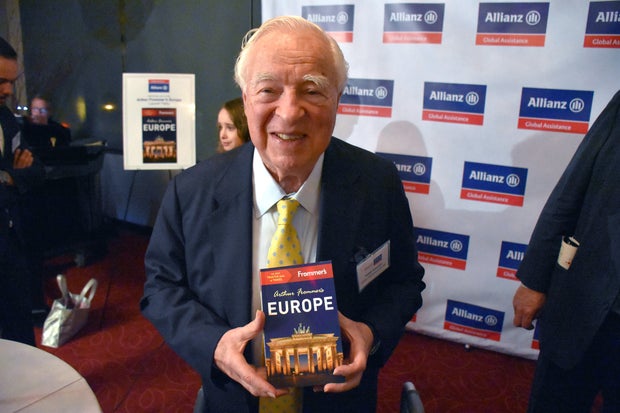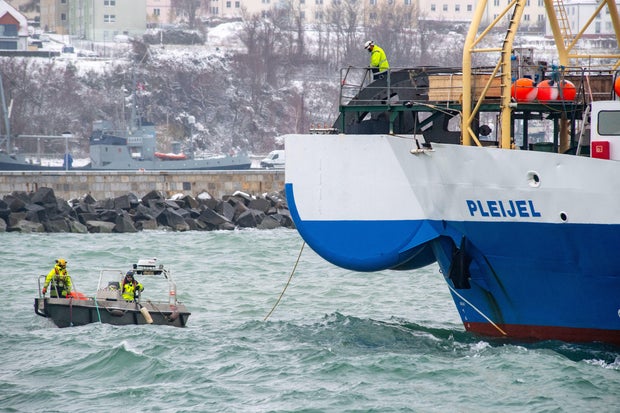CBS News
Arthur Frommer, famed travel guide innovator, has died at 95

New York — Arthur Frommer, whose “Europe on 5 Dollars a Day” guidebooks revolutionized leisure travel by persuading average Americans to take budget vacations abroad, has died. He was 95.
Frommer died from complications of pneumonia, his daughter Pauline Frommer said Monday.
“My father opened up the world to so many people,” she said. “He believed deeply that travel could be an enlightening activity and one that did not require a big budget.”
Chris Melzer / picture alliance via Getty Images
Frommer began writing about travel while serving in the U.S. Army in Europe in the 1950s. When a guidebook he wrote for American soldiers overseas sold out, he launched what became one of the travel industry’s best-known brands, self-publishing “Europe on 5 Dollars a Day” in 1957.
“It struck a chord and became an immediate best-seller,” he recalled in an interview with The Associated Press in 2007, on the 50th anniversary of the book’s debut.
The Frommer’s brand, led today by Pauline Frommer, remains one of the best-known names in the travel industry, with guidebooks to destinations around the world, an influential social media presence, podcasts and a radio show.
Frommer’s philosophy – stay in inns and budget hotels instead of five-star hotels, sightsee on your own using public transportation, eat with locals in small cafes instead of fancy restaurants – changed the way Americans traveled in the mid- to late 20th century. He said budget travel was preferable to luxury travel “because it leads to a more authentic experience.” That message encouraged average people, not just the wealthy, to vacation abroad.
It didn’t hurt that his books hit the market as the rise of jet travel made getting to Europe easier than crossing the Atlantic by ship.
The books became so popular that there was a time when you couldn’t visit a place like the Eiffel Tower without spotting Frommer’s guidebooks in the hands of every other American tourist.
Seth Wenig / AP
Frommer’s advice also became so standard that it’s hard to remember how radical it seemed in the days before discount flights and backpacks.
“It was really pioneering stuff,” Tony Wheeler, founder of the Lonely Planet guidebook company, said in an interview in 2013. Before Frommer, Wheeler said, you could find guidebooks “that would tell you everything about the church or the temple ruin. But the idea that you wanted to eat somewhere and find a hotel or get from A to B — well, I’ve got a huge amount of respect for Arthur.”
“Arthur did for travel what Consumer Reports did for everything else,” said Pat Carrier, former owner of The Globe Corner, a travel bookstore in Cambridge, Massachusetts.
The final editions of Frommer’s groundbreaking series were titled “Europe from $95 a Day.”
Frommer guides reborn
The concept no longer made sense when hotels couldn’t be had for less than $100 a night, so the series was discontinued in 2007. But the Frommer publishing empire didn’t disappear, despite a series of sales that started when Frommer sold the guidebook company to Simon & Schuster. It was later acquired by Wiley Publishing, which in turn sold it to Google in 2012. Google quietly shut the guidebooks down, but Arthur Frommer – in a David vs. Goliath triumph – got his brand back from Google. In November 2013 with his daughter Pauline, he relaunched the print series with dozens of new guidebook titles.
“I never dreamed at my age I’d be working this hard,” he told the AP at the time, age 84.
Frommer also remained a well-known figure in 21st century travel, opinionated to the end of his career, speaking out on his blog and radio show.
He hated mega-cruise ships and railed against travel websites where consumers put up their own reviews, saying they were too easily manipulated with phony posts. And he coined the phrase “Trump Slump” in a widely quoted column that predicted a slump in tourism to the U.S. after Donald Trump was elected president the first time.
Depression-era roots
Frommer was born in Lynchburg, Virginia, and grew up during the Great Depression in Jefferson City, Missouri, the child of a Polish father and Austrian mother. “My father had one job after another, one company after another that went bankrupt,” he recalled. The family moved to New York when he was a teenager. He worked as an office boy at Newsweek, went to New York University and was drafted upon graduating from Yale Law School in 1953. Because he spoke French and Russian, he was sent to work in Army intelligence at a U.S. base in Germany, where the Cold War was heating up.
His first glimpse of Europe was from the window of a military transport plane. Whenever he had a weekend leave or a three-day pass, he’d hop a train to Paris or hitch a ride to England on an Air Force flight.
Eventually, he wrote “The GI’s Guide to Traveling in Europe” and, a few weeks before his Army stint was up, he had 5,000 copies printed by a typesetter in a German village. They were priced at 50 cents apiece and distributed by the Army newspaper, Stars & Stripes.
Shortly after he returned to New York to practice law at the firm Paul, Weiss, Rifkind, Wharton & Garrison, he received a cable from Europe. “The book was sold out, would I arrange a reprint?” he said.
Soon after, he spent his month’s vacation from the law firm doing a civilian version of the guide. “In 30 days I went to 15 different cities, getting up at 4 a.m., running up and down the streets, trying to find good cheap hotels and restaurants,” he recalled.
The resulting book, the very first “Europe on 5 Dollars a Day,” was much more than a list. It was written with a wide-eyed wonder that verged on poetry: “Venice is a fantastic dream,” Frommer wrote. “Try to arrive at night when the wonders of the city can steal upon you piecemeal and slow. … Out of the dark, there appear little clusters of candy-striped mooring poles; a gondola approaches with a lighted lantern hung from its prow.”
Frommer eventually gave up law to write the guides full-time.
Daughter Pauline joined him with his first wife, Hope Arthur, on their trips starting in 1965, when she was 4 months old. “They used to joke that the book should be called ‘Europe on Five Diapers a Day,'” Pauline Frommer said.
In the 1960s, when inflation forced Frommer to change the title of the book to “Europe on 5 and 10 Dollars a Day,” he said “it was as if someone had plunged a knife into my head.”
Dispelling false impressions
Asked to summarize the impact of his books in a 2017 Associated Press interview, he said that in the 1950s, “most Americans had been taught that foreign travel was a once-in-a-lifetime experience, especially travel to Europe. They were taught that they were going to a war-torn country where it was risky to stay in any hotel other than a five-star hotel. It was risky to go into anything but a top-notch restaurant. … And I knew that all these warnings were a lot of nonsense.”
He added: “We were pioneers in also suggesting that a different type of American should travel, that you didn’t have to be well-heeled.”
To the end of his life, he said he avoided traveling first class. “I fly economy class and I try to experience the same form of travel, the same experience that the average American and the average citizen of the world encounters,” he said.
As Frommer aged, his daughter Pauline gradually became the force behind the company, promoting the brand, managing the business and even writing some of the content based on her own travels. Her relationship with her father was both tender and respectful, and she summed it up this way in a 2012 email to AP: “It’s wonderful to have a working partner whose mind is a steel trap and who doesn’t just have smarts, but wisdom. His opinions, whether or not you agree with them, come from his social values. He’s a man who puts ethics at the center of his life, and weaves them into everything he does.”
In addition to Pauline, Frommer’s survivors include his second wife, Roberta Brodfeld, and four grandchildren.
CBS News
Undersea cables cut or damaged, and European governments hint at possible Russian sabotage

Two undersea cables carrying internet data deep in the Baltic Sea have been damaged, European telecommunications companies have said, drawing warnings from European governments of possible Russian “hybrid warfare” targeting global communications infrastructure.
The foreign ministers of Finland and Germany said in a joint statement on Monday that a cable connecting the two countries had been cut and that the incidents had raised suspicion of possible sabotage.
“A thorough investigation is underway. Our European security is not only under threat from Russia’s war of aggression against Ukraine, but also from hybrid warfare by malicious actors,” the ministers said, without blaming any particular entity for the possible sabotage.
Stefan Sauer/picture alliance/Getty
The Finnish company Cinia confirmed Monday that its submarine cable between Finland and Germany was damaged. The cable is about 730 miles long and connects telecommunications networks in central Europe to Finland and other Nordic countries.
“The details of the fault are yet not known and are currently being investigated,” the company said in a statement on its website.
Swedish company Arelion confirmed to CBS News on Tuesday that one of its cables was also damaged.
“We can confirm that one of our subsea fiber cables — the one between Gotland, Sweden and Šventoji, Lithuania — is damaged. The issue was detected on November 17, and we currently do not know what caused it as we have not been able to examine the cable,” Arelion spokesperson Martin Sjögren told CBS News.
“Arelion is in contact with Swedish authorities and the Swedish Armed Forces regarding the incident. The cable will be repaired over the next few weeks depending on weather conditions,” he said.
Audrius Stasiulaitis, a spokesperson for the Swedish multinational telecom company Telia, which uses and operates the Arelion cable, said the firm believed the cable was physically damaged.
“We can only speculate on what has happened, but as far as we see, it is not affected by equipment failure and we presume it’s physical damage,” he told CBS News over the phone on Tuesday.
The damage to the cables comes after reports over the past year that Russia may be targeting key infrastructure connecting Nordic countries.
An April 2023 joint investigation by the public broadcasters of Sweden, Denmark, Norway and Finland found that Moscow was operating a fleet of suspected intelligence vessels in Nordic waters as part of a Kremlin campaign potentially aimed at targeting underwater cables and wind farms.
There have been attacks on European infrastructure since Russia launched its full-scale invasion of Ukraine 1,000 days ago.
In September 2022, the Nord Stream 1 and Nord Stream 2 pipelines, both designed to carry natural gas from Russia to Germany under the Baltic Sea, were damaged by explosions.
Both Ukraine and Russia denied any involvement in the explosions. In August, German media reported that prosecutors had issued an arrest warrant for a Ukrainian man over the pipeline attacks.
Sweden and Finland have both joined the NATO military alliance over the past two years, as the war in Ukraine fuels concern about Russia’s possible intentions, and just this week, both countries updated their war preparation guidance and published online booklets for citizens to prepare for the eventuality of a war or other crisis.
CBS News
Trump win fuels discussion of Israel annexing the West Bank. Here’s what that means.

In the wake of former President Donald Trump’s re-election, Israel’s far-right minister of finance suggested the country would look to annex the occupied West Bank in 2025. Here’s what you need to know:
What is the West Bank?
The West Bank is an area of land on the west bank of the Jordan River, which is part of the former British-mandated territory of Palestine. It is surrounded by Israel on three sides — the north, west, and south — and it borders the country of Jordan on its east, across the river.
After the departure of British forces in 1948 when the modern state of Israel was created, Arab forces entered and retained the West Bank, and the city of Jerusalem was divided into two sectors: the Israeli west and the Jordanian east.
During the Six-Day War in 1967, Israel occupied the West Bank and established a military administration there. Israel claimed East Jerusalem as part of its own territory, but fighting between the Israelis and the region’s Palestinian inhabitants — who live with significant restrictions on their movement and other aspects of life under the decades-long occupation — has continued.
Getty/iStockphoto
Hamas, designated a terrorist organization by the United States and Israel, decisively won a 2006 West Bank parliamentary election over the Western-backed Fatah faction, led by Mahmoud Abbas, which had been administering the Palestinian Authority. The Hamas victory brought sanctions and boycotts by the U.S., the EU and Israel of the new, Hamas-led joint Palestinian leadership.
In 2007, Abbas dissolved the Hamas-led administration in the West Bank and created an emergency cabinet that favored Fatah. The power struggle between the two Palestinian factions led to a split between the West Bank and Gaza, with Western powers supporting the Fatah-administered West Bank diplomatically and economically, while blockading the Hamas-run Gaza Strip.
How could U.S. policy change during the second Trump administration?
The longstanding position of the United States has been support for a two-state solution to the conflict between Israelis and Palestinians, meaning the creation of an independent state of Palestine alongside the independent state of Israel. Most iterations of this policy envision a future Palestinian state made up of the West Bank and East Jerusalem, as well as Gaza.
Trump’s previous administration bucked tradition, but did not flat-out reject a two-state solution. Trump moved the U.S. embassy from Tel Aviv to Jerusalem and offered a plan that would have cemented Israeli control over the entire city. It also would have protected Israeli settlements in the West Bank, which are illegal under international law, while moving toward Palestinian self-rule.
President-elect Trump’s pick to serve as the next U.S. Ambassador to Israel, former Arkansas governor and Baptist preacher Mike Huckabee, has never supported a two-state solution.
In an interview with The Associated Press when he was running to be the Republican presidential nominee in 2015, Huckabee said that, if elected, his administration would formally recognize the West Bank as part of Israel.
“I feel that we have a responsibility to respect that this is land that has historically belonged to the Jews,” Huckabee told the AP.
In a podcast interview earlier this year, Huckabee said that there “isn’t such a thing” as Palestinians, describing himself as an “unapologetic, unreformed Zionist.” He voiced similar views during his campaign in 2008.
Israel “is an extraordinary oasis in a land of totalitarianism surrounded by tyranny,” he said on the podcast earlier this year.
Florida Sen. Marco Rubio, Trump’s pick for Secretary of State, has repeatedly voiced support for the Israeli government’s response to Hamas’ brutal Oct. 7, 2023 attack.
“Although the Biden-Harris Administration has publicly backed Israel’s right to defend itself, it has also undercut Israel’s maneuverability, leading to a schizophrenic policy towards the region,” Rubio said in a letter to current Secretary of State Antony Blinken in August.
Voicing his objection to U.S. sanctions against individuals alleged to be supporting “extremist settler violence” against Palestinians in the West Bank, Rubio wrote that, “Israel has consistently sought peace with the Palestinians. It is unfortunate that the Palestinians, whether it be the Palestinian Authority or FTOs such as Hamas, have rejected such overtures. Israelis rightfully living in their historic homeland are not the impediment to peace; the Palestinians are.”
Israel’s far-right government says it’s preparing for annexation of the West Bank
Some of those who do not support the creation of an independent Palestinian state do support Israel’s annexation of the West Bank, including members of the current far-right Israeli government led by Netanyahu.
Netanyahu’s Likud party is currently part of a coalition, formed to keep Netanyahu in power, with radical right-wing nationalist parties such as the Religious Zionist Party.
Netanyahu, who has spoken out against the creation of a Palestinian state, committed to pursuing the annexation of the West Bank in Likud’s coalition agreement with the Religious Zionist Party.
“The people of Israel have a natural right to the Land of Israel,” the agreement says. “In light of the belief in the aforementioned right, the Prime Minister will lead the formulation and promotion of a policy within the framework of which sovereignty will be applied in the West Bank, while choosing the timing and considering all national and international interests of the state of Israel.”
Bezalel Smotrich, the Israeli finance minister who’s a member of the Religious Zionist Party, said he believed Israel could work with the incoming Trump administration to promote annexation of the West Bank.
“I am convinced that we will be able to work closely together with President-elect Trump and all members of the incoming administration, to promote the common values and interests of the two countries, to strengthen the strength and security of the State of Israel, to expand the circle of peace and stability in the Middle East out of strength and faith and on the basis of recognition in the unquestionable historical belonging of the whole Land of Israel to the people of Israel,” Smotrich said on social media.
Israeli settlements and smaller outposts in the West Bank are illegal under international law. They’re also seen as a barrier to a potential two-state solution, because the more Israeli Jews live in the occupied territory, the less likely it seems that Israel would ever abandon control of the land for it to become part of a Palestinian state.
A Pew Research Center survey carried out in the summer found Israelis divided on the potential security risks and benefits of continued settlement expansion, with 40% of respondents saying they help make Israel more secure and 35% saying they hurt security. The survey found 21% of Israelis didn’t believe settlement expansion would have any significant impact on security.
Some Israeli activists believe their government is taking advantage of the country’s collective grief after the Oct. 7 attack to push an agenda in the West Bank that doesn’t have broad public backing.
“In Israel, there’s very little public criticism or any sort of public debate on what is going on in the West Bank,” Sarit Michaeli, international advocacy lead for the Jerusalem-based rights group B’Tselem, told CBS News of the situation post-Oct. 7 attack. “Israelis are furious. They’re angry. They’re hurt. They’re traumatized, and this collective trauma has been exploited by our government to push forward policies that most Israelis don’t necessarily agree with in the West Bank.”
In June, the Israeli body that governs the West Bank transferred many powers over the territory from Israeli military officials to civil ones, who work under Smotrich.
Since the Oct. 7 Hamas attack, the monitoring group Peace Now says it has documented at least 43 new illegal outposts in the West Bank, mostly on farmland. Dozens of new roads have been paved to facilitate the establishment of these outposts, the group said.
What would it mean if Israel does annex the West Bank?
In 2020, Tel Aviv University’s Institute for National Security Studies (INSS) analyzed what Israeli annexation of the West Bank could actually entail. They looked at three possible scenarios, with Israel either taking full security and administrative control of a portion of the Palestinian territory, or just preventing future evacuation of existing Israeli settlements.
In all three of the scenarios examined, Israeli sovereignty would not necessarily be applied in full to Palestinians in the area. If it were to be, Palestinians would live under the jurisdiction of the State of Israel and, under Israeli law, would be entitled to request citizenship.
Nasser Ishtayeh/SOPA Images/LightRocket/Getty
The INSS said annexing West Bank territory would make it harder for future Israeli governments to give up that land as part of any deal to create a Palestinian state.
“In actuality, annexation means tying the hands of future Israeli governments that would be willing to transfer territories for a political settlement,” the INSS report said.
One senior Palestinian politician in Gaza recently told CBS News that regardless of what changes Israel ushers in under the new leadership in Washington, it would not end the Palestinian people’s decades-long fight for a state of their own.
“We will struggle for our rights,” Mustafa Barghouti, a doctor in Gaza and the leader of the Palestinian National Initiative party, told CBS News. The Palestinian National Initiative party champions a unified democratic government for both the West Bank and Gaza.
“It will take time. We will suffer. We know that. But what’s the alternative? To cease to exist? It’s ethnic cleansing. We cannot accept that,” Barghouti said.
CBS News
Bird flu reaches Hawaii, the last state that had escaped it

Authorities in Hawaii are warning residents who attended a local pet fair to watch for symptoms of avian influenza after a local flock of ducks and other birds tested positive for the H5N1 virus that has fueled a global outbreak of infections.
Officials suspect wild migrating birds are likely to blame for the first known infection of a flock in Hawaii, which had been the last state in the country with no reported cases in poultry or wild birds during the current outbreak.
Sequencing done by the U.S. Department of Agriculture’s national lab in Iowa confirmed the infection, federal officials announced Monday.
The specific genotype of the virus that infected the birds is known as A3, said Lyndsay Cole, a spokesperson for the federal Animal Plant Health Inspection Services.
This is different from the B3.13 genotype that has been fueling this year’s unprecedented outbreak on dairy and poultry farms and suggests the virus spilled over into the flock in Hawaii from migrating wild birds.
Investigators have not turned up any links so far between the flock and imported animals or travel, a spokesperson for Hawaii’s Agriculture Department said. The island has “strict importing regulations for birds and other animals,” the spokesperson said.
All the infected birds were housed at the same site, though investigations are ongoing to root out other potential cases. The birds were also not symptomatic until several days after the fair, the state Health Department said, lowering the risk to humans.
“As the birds were not showing signs of infection at the time of the fair, the likelihood of spreading H5N1 to humans is low. However, out of an abundance of caution, DOH recommends that individuals who attended the fair and touched a duck or goose monitor for influenza-like illness (ILI) and conjunctivitis,” the state said in a release.
A quarantine order was issued for the property where the birds lived and all will be required to be “depopulated and the premises cleaned and disinfected,” the state Agriculture Department said. An order was also issued to prevent any animals from being moved in or out of the site.
At least 10 birds, which included ducks, a goose and a zebra dove, had been reported dead at the property on Nov. 12. Samples from the dead birds were sent to be tested for the virus.
Closely watching for human cases
Confirmation of the infected flock in Hawaii follows a detection of the virus in the area from wastewater samples collected by the state earlier this month.
Health officials around the country have been closely watching for signs of H5N1 spreading in their communities amid mounting cases in humans across North America.
At least 53 cases have been confirmed across seven states so far this year, the federal Centers for Disease Control and Prevention (CDC) says. Most are linked to the B3.13 version of the virus that has been infecting workers at dairy farms and nearby poultry farms in recent months. None of them are known to have been severely ill.
Health officials in Canada announced this month that they had detected a case of H5N1 bird flu in a critically ill hospitalized teenager. That patient had been infected by the D1.1 genotype of H5N1, which is related to another ongoing poultry outbreak in British Columbia, the Canadian province where they lived.
Experts say the virus that infected the teenager does appear to have some worrying mutations, which might explain why the case was more severe.
“The preliminary sequence from the H5N1 human case in British Columbia has been posted and it is not good news,” Scott Hensley, a professor of microbiology at the University of Pennsylvania, posted on Nov. 16.
Genetic sequencing data from human cases so far in the U.S. have not found any signs of the virus mutating to spread more efficiently between humans or to be significantly more dangerous, the CDC says.
But the agency also recently found evidence that several cases had been asymptomatic and gone undetected during the outbreak so far, prompting stepped up testing recommendations.













